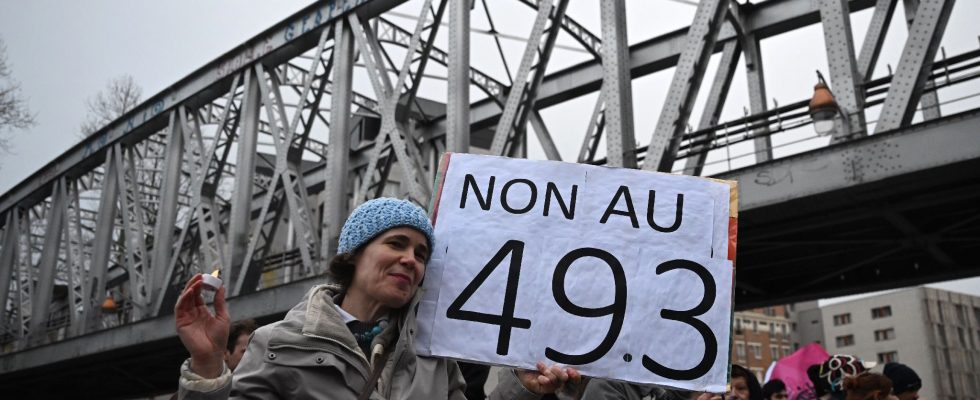The intervention of Emmanuel Macron has not calmed anything: the unions are organizing, Thursday, March 23, a ninth day of strikes and demonstrations against the pension reform and the use of 49.3, convinced that the “stubbornness” of the president of the Republic will strengthen the determination of the opponents. This day is the first organized at the national level after the adoption of the law via the constitutional weapon of 49.3, on March 15.
The day before, spontaneous wanderings of a few hundred people took place in several cities, like every evening for almost a week, but the incidents were limited.
> L’Express takes stock summarizes the essentials of this day
READ ALSO: OUR ANALYSIS: Laurent Berger trapped in provocation
READ ALSO: OUR EDITORIAL: A skin of grief president
READ ALSO: BEHIND THE SCENES: Between Borne and his ministers, a meeting that comes to an end
READ ALSO: OUR ANALYSIS: Communists in government?
The disrupted rail
The RATP and the SNCF announced a highly disrupted traffic: the FO-RATP union, the first among metro drivers, called, after the activation of 49.3, to make Thursday “a black day” in transport. At the SNCF, only half of the TGV Inoui and Ouigo and a third of the TER are running. As for the metro, only automated lines (1 and 14) will run normally. The RATP plans one in two trains for lines 7, 7bis, 9, 10 and 13 and one in three trains for lines 2, 3, 3bis, 5, 6, 8 and 12. Regional transport networks should also be affected such as the Ligne d’Azur network in Nice.
Since 6 a.m. this Thursday morning, the bus depot in the town of Pantin, in Seine-Saint-Denis, has been blocked by several dozen demonstrators. Among them, several dozen union delegates from the CGT who are also trying to take over the neighboring road.
In the Paris region, very strong disturbances are also indicated on the side of the Transilien lines. Line K will not run during off-peak hours. One out of two RER will run on lines A and B. One out of three trains is scheduled for RER C and lines H, J, L, N, P and U. Two out of five trains on average are announced for RER D and line R. For the RER E, one train out of five on average is planned.
Between 600,000 and 800,000 demonstrators in the processions?
Without advancing a number of demonstrators, union officials are again calling for a “massive” mobilization. The police predict “between 600 and 800,000 people on around 320 actions”, including 40 to 70,000 in Paris, where the procession will set off at 2 p.m. from the Place de la Bastille, towards the Place de l’Opéra. About 500 yellow vests and 500 radical elements are expected in Paris, and “in the provinces more than ten cities will see demonstrations of the ultra left”, according to the police. As for the police, some 12,000 police officers will be mobilized in France, including 5,000 in the capital.
School strikes
Between 40 and 50% of strikers are expected in nursery and elementary schools, according to the Snuipp-FSU, the first primary union. The FIDL high school student union called for “massive blockades throughout the territory” on Thursday and Friday. Strong mobilizations are expected in the Bouches-du-Rhône, in the Pyrénées-Orientales or even in Paris, where 70% of strikers are expected.
Kerosene supply disruptions
The supply of kerosene to Ile-de-France and its airports by Normandy “is becoming critical” due to strikes in refineries, said Thursday the Ministry of Energy Transition which is ready to requisition strikers.
Given this situation, the government has “issued a requisition order” with regard to the strikers at the TotalEnergies refinery in Normandy, which was shut down last weekend and where fuel shipments are blocked; “but it has not been decided to notify it at this stage,” the ministry added. “The government is monitoring the situation hour by hour and department by department with professionals and prefects. We are intervening in a targeted manner to unblock deposits that are obstructed by demonstrators. As soon as requisitions cannot be avoided, we will take our responsibilities “, declared the Minister of Energy Transition, Agnès Pannier-Runacher.
For its part, the General Directorate of Civil Aviation has been warning airlines for several days that the kerosene reserves at Paris-Charles-de-Gaulle and Paris-Orly airports are “under tension”, encouraging them to take their precautions, publishing two “Notices for Air Missions” (NOTAM) to this effect.
Fewer planes in the sky
In the air sector, the Directorate General for Civil Aviation (DGAC) has asked airlines to cancel 30% of flights at Orly and 20% at Lyon, Marseille and Toulouse, following the mobilization of air traffic controllers against the reform. retirements. The mobilization is therefore up slightly, the DGAC having asked the companies to cancel Tuesday and Wednesday 20% of their flights to Paris-Orly and Marseille-Provence (south-east).
